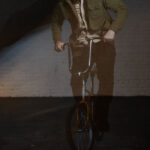Osborne
“Hello Kelly, goodbye Jack, hello Betty, I’m ‘Back to Black’/We got Soboxone and security/I was in the Osbornes, it was you and me,” sings Trapper Schoepp on his new album titled Osborne, coming fall 2025. After relying on prescription painkillers and other substances for a decade, Trapper checked into the Hazelden Betty Ford rehab center near his birthplace in Minnesota last year. Fittingly, the rock n roller was placed in the ‘Osborne’ unit – a letter off from Ozzy’s surname but appropriated as such to honor the former Hazelden patient.
“Recording this album was an exorcism of my demons,” says Trapper, who cut the album in a church basement in California, a month after leaving Osborne. “I kept asking myself if this was a test or torture. I realized that if cleaning myself up was the torture, putting it all down on paper honestly was the test,” Trapper says. “I needed both.”
Channeling Black Sabbath, Suicide and Springsteen, this 11-track record is wildly different than anything Trapper has done. Produced by pop polymath Mike Viola (Andrew Bird, Dawes) and multi-instrumentalist Tyler Chester (Madison Cunningham, Jackson Browne), Trapper feels like he’s finally finding an honest voice in song and spirit.
In heavy songs like “Satan is Real (Satan is a Suckler),” Trapper takes aim at the famous Sackler family -who generated billions of dollars from Oxycotin with Purdue Pharma in the early 2000s and in turn created millions of addicts.
“They blame it on a pusher/They blame it on a cracker/But I know the truth/So I blame it on a Sackler/Took Valium not to feel/And Oxy to district her/Satan is real, Satan is a Sackler”
Trapper’s path to prescription pills came through what he simply refers to as, “A series of unfortunate events involving bicycles.” His love of BMX and extreme sports can be heard on the rollicking, “Three Speed Queen.” The child narrator pleads for a new bicycle, alongside Biblical visions of death and Ezekiel’s wheels.
“What started physical turned psychological,” Trapper says. “My spinal surgery was the culprit but my body kept the score and I began paying the toll.”
Since having spinal decompression surgery in his early twenties, Trapper says he’s had a fair share of both positive and negative hospital visits. A more darkly humorous interaction with doctors can be heard on the album’s first single, “Loaded.”
“A pain management doctor said to my face that he helped patients get on these drugs but not off of them,” Trapper says. “They wrote me advance prescriptions that I could fill at my leisure. I thought they were like loaded guns just sitting in my desk, which is where that title comes from.”
He sings, “It’s long and orange with a child proof lid/It jingles like a tambourine where I once hid/It outta be a crime the whole world should know/Your face on a true crime, reality show/You ain’t gave me nothing but a loaded gun.”
The album begins with a wall of vintage synths on “Wildfire,” conjuring up 80s Springsteen. Trapper sings, “I’m a wildfire and I’m burning of out of control/I’m a high speed driver and I got nowhere to go.”
For as much heartache is heard in Osborne, Trapper is quick to shift to humor and a self awareness of the well-trodden musical territory. “I’m a heavy metal parody/I was guilty to the highest degree,” he sings in “No Fly List.” Even on “Suicide Summer,” Trapper sings of his darkest days to a breezy reggae rhythm inspired by Toots and the Maytals. “I wanted this album to feel celebratory and not maudlin.”
Trapper’s more gory experiences in and out of the hospital are faced head on in “Mad, Mad, Mad (Sweet Salvation)” – the first song he wrote with producer Mike Viola.
“Mike encouraged me to lean into the pain and not run from it,” Trapper says. “It felt like I was back in the art therapy room of Hazelen but with Tony Iommi (Black Sabbath) at the wheel.
“Much of the album was recorded live to tape, with an emphasis on capturing an honest performance rather than a perfectly executed piece of music. The album’s co-producer, Tyler Chester, played bass, drum machines and keys on the album — coming off a strong run of credits with Jackson Browne, Iron and Wine and Madison Cunningham.
The 34-year-old Milwaukee singer has been releasing records under Trapper Schoepp since signing to SideOneDummy 2012, but skipped his surname for the artwork. “This is artwork inspired by what’s historically an anonymous community,” he says. “I want to be cautious of that but also set fire to the stigma around addiction.” Trapper is seen with a burning guitar in his mouth for the cover.
Trapper’s past records have been roots rock oriented, finding him on tours alongside Americana stalwarts like The Wallflowers, The Jayhawks and Old 97’s. Most notably, the singer published a song with Bob Dylan in 2019 called “On, Wisconsin.” But this time around, Trapper found inspiration in old-school hip hop, reggae and Black Sabbath.
“It was a balm for the worst of times,” he says. “These are artists that took their lowest of lows and created their rawest work.”
On the train ride to Hazelden, Trapper was listening to Sabbath, and Googled a brief history of the facility he was headed into. He read a single quote about the rehab facility by Ozzy which simply said, “That was a tough one. They don’t f*ck around.” When he arrived, he was assigned to the ‘Osborne’ unit, a letter off from Ozzy’s surname but many in the unit appropriated it in his honor.
“There was heavy metal themed artwork, a guitar Clapton left there and copies of ‘The Osbournes’ DVDs laid out. I felt at home and a kinship with those I met there, hence the title.”
As much as the album came from a dark place, Trapper says the creation was a joyful process. He had previously written a country album that he’d intended to record with Viola, but it was scrapped for these more timely songs.
“Nothing about recovery has to be gloom and doom,” he says. “I was naive about opioids and other substances but many in the healthcare industry were, too. I am a survivor and this isn’t a sad story.”
You only get swerve hard for the first time once and ‘Osborne’ is just that for Trapper. He says, “There’s a shame surrounding addiction and it leads people further into isolation and using. If I can help one person with this album, it feels worth it.”










